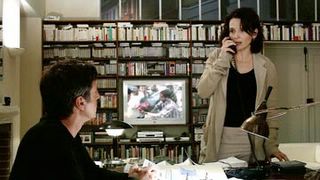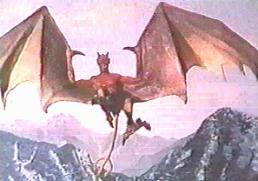So vile are Sean Hannity and Rush Limbaugh, they kind of steal the spotlight away from other right-wing radio assholes equally deserving of our scorn. For example, this Dennis Prager column from Townhall may just be the stupidest thing I have yet read in 2006.
Before I even get into the column, see if you can wrap your head merely around Prager's thesis:
He wonders aloud why liberals, in general, seem more concerned about global warming than conservatives.
One would think it's pretty easy to answer this question. If you want to know why liberals are concerned about global warming, just ask some of them. Or even go see Al Gore's new movie. Or read a newspaper article. And if you want to know why conservatives aren't concerned about global warming...well, just think about that for yourself, D.P. You're a conservative and you're not concerned about global warming. You must have a reason, right? Other than the fact that you want to hang on to this lucrative Townhall.com writing gig, surely a mere stepping stone on your path to...um...somewhere. Maybe Ben Shapiro's apartment for warm Tang and microwavable taquitos (which we proud native English speakers call "zesty corn chip flavor wraps.")
Once you've considered both sides, simply compare and contrast. BAM! You've got yourself a column.
Unfortunately, this journalistic approach, in which two perspectives have been weighed and then a statement made about their relative validity and logical sense, wouldn't really play too well to the drooling yahoo readers of Townhall.
"I discovered something interesting. Liberals are afraid of global warming because it will create huge shifts in the delicately-balanced ecosystem that could cause a refugee problem, starvation and death on a previously unknown scale, threatening the very survival of our species. Conservatives aren't afraid of global warming because Big Powerful George Bush told them everything would work out alright because he's watching out for them and would never let the bad atmosphere do anything naughty. I mean, he's the Deciderer, so what's Nature going to do if he's already decideded to save America from global warming?"
Instead, Prager produces this piece of mindless dross about the Liberal Deficiencies that make them inherently afraid of global warming. Even though it's, like, totally made up or something.
The usual liberal responses -- to label a conservative position racist, sexist, homophobic, xenophobic, Islamophobic or the like -- obviously don't apply here. So, liberals would have to fall back on the one remaining all-purpose liberal explanation: "big business." They might therefore explain the conservative-liberal divide over global warming thus: Conservatives don't care about global warming because they prefer corporate profits to saving the planet.
But such an explanation could not explain the vast majority of conservatives who are not in any way tied into the corporate world (like this writer, who has no stocks and who, moreover, regards big business as amoral as leftists do).
Before I even get into the real meat of Prager's piece, he makes a few completely bogus assumptions right here in the opening paragraphs that must be cleared up. Issues like global warming can not be simplified into binary oppositions. Politicians may have aligned on this issue according to party lines, but that's because they are nearly all corrupt liars more interested in keeping their jobs than in honesty or the future of their nation. Individual Americans have their own opinions about the environment, near as I can tell, and it's not always as easy as pinpointing their spot on the political spectrum.
I'm sure there are plenty of liberals who find the threat of global warming overblown. Likewise, I'm certain there are conservatives worried about the environment and the future of our species and the threat of carbon dioxide emissions to our habitat. The only reason to transform the diverse American electorate's opinions on this matter into a black-or-white party-line vote is because you want to make this a partisan issue. "If you're a conservative, you don't care about global warming. Okay? Everybody got that? Cause I won't mention it again."
Also, Dennis assumes that people accuse conservatives of being sexist, racist, homophobic and xenophobic (which covers being an Islamaphobe, making Dennis' paragraph redundant) to earn political points. But no politicians or staunch Democratic partisans ever say stuff like this about conservatives. Outspoken progressive writers and activists and bloggers do. And they're not trying to make political hay out of these issues. They genuinely think conservatives are racist, sexist, homophobic and xenophobic bigots. (I know I do...)
Finally, Dennis assumes that the use of anecdotal evidence in a column about global warming has any meaning at all. "Well, I don't like big companies and I don't believe in global warming. So there!" What an asshole.
No, the usual liberal dismissals of conservatives and their positions just don't explain this particularly illuminating difference between liberals and conservatives.
This is the one line in Dennis' column with which I fully agree. (Well, this and the byline. I have no doubt Dennis Prager really wrote this stupid piece of shit.) I would say this is a particularly illuminating difference between two ways of seeing the world. Those who see what they want to see because the big strong Cowboy in Command told them so and those proud few Americans who continue to embrace reality. It takes a certain kind of chutzpah to ignore the opinions of every scientist and expert in a given field and then to write a column explaining why everyone else is screwed up.
So now Dennis goes into the body of his column, in which he advances The Top Six "Explanations" for Why Liberals are Afraid of Global Warming. From the home office in Sioux City, Iowa. ("Because it's happening," unfortunately, doesn't make the cut, nor do any jokes about Joey Buttafuoco.)
The Left is prone to hysteria. The belief that global warming will destroy the world is but one of many hysterical notions held on the Left.
As Amanda at Pandagon rightfully points out, no one believes global warming will destroy the world. Many believe that it will cause the human race untold amounts of suffering. Big dif.
As noted in a previous column devoted to the Left and hysteria, many on the Left have been hysterical about the dangers of the PATRIOT Act and the NSA surveillance of phone numbers (incipient fascism); secondhand smoke (killing vast numbers of people); drilling in the remotest area of Alaska (major environmental despoliation); and opposition to same-sex marriage (imminent Christian theocracy).
Get this...Prager's writing a series of columns about the "hysterical left" without noting the irony that his enthusiasm for the topic could easily be viewed as its own form of...hysteria. Is enthusiasm among progressives for issues they see as massively important to the future of our nation really so abominable that it requires not one but a series of columns? Who's being hysterical?
I would like to point out, however, that I also think people make too much of second-hand smoke. Because, as I said before, the notion that Americans are divided into two diametrically opposed camps is childish. Everyone knows there is diversity of opinion about all of these topics. That's why we're constantly polling Americans to see what they think. Otherwise, it would just be an even split down the middle on every issue.
How ludicrous, by the way, is it to imply that it's the liberals who are hysterical on the same-sex marriage issue. We just think dudes should be allowed to have weddings. It's the opposition to this rather reasonable request that are constantly invoking the Bible and screeching about family values and attempting to amend the freaking Constitution. How twisted can his logic possibly get?
The Left believes that if The New York Times and other liberal news sources report something, it is true. If the cover of Time magazine says, "Global Warming: Be Worried, Very Worried," liberals get worried, very worried, about global warming.
Yeah, those stupid libruls. Reading newspapers and magazines and digesting the information contained within. When will they learn that you can only trust everything you hear on Fox News and all other forms of media are to be ignored?
Holy shit, I'm only 1/3 of the way through Dennis' list and already I feel drained. Maybe I should start slamming Red Bull or something. Otherwise, I'll never make it. Sorting through all these contorted arguments is like navigating the Fire Swamp. (And now that I think about it, Dennis Prager does kind of look like a Rodent of Unusual Size.)
Observe:


Uncanny.
It is noteworthy that liberals, one of whose mottos is "question authority," so rarely question the authority of the mainstream media.
Dennis, are you high? So-called liberals criticize the media constantly. Like every day. Ever been to Media Matters? Bothered to stop by and read anything on Firedoglake or Eschaton ever? Eric Boehlert has just written an entire BOOK on the subject called Lapdogs that's available now. Jon Stewart's a guy who has regularly been cited as a liberal and he hosts a DAILY SHOW devoted exclusively to skewering the mainstream media.
Also, is he trying to say that people shouldn't question authority? Ever? How does one even go about becomign so firmly entrenched in the bullshit establishment? You hear urban folk tales about The Man, but you never expect to actually see him attempting to keep his brother man down right in front of your face in real time.
The Left believes in experts.
Bear in mind, folks, this list is meant as a collection of The Left's faults. Those more liberal than Prager are wrong to trust people who know what they are talking about. Because there's always a chance they'll tell you something you'd rather not know, and then where are you? Fucked, that's where. This is why we need more Ten Commandments and less Evolutions in our schools, people!
Of course, every rational person, liberal or conservative, trusts the expertise of experts -- such as when experts in biology explain the workings of mitochondria, or when experts in astronomy describe the moons of Jupiter. But for liberals, "expert" has come to mean far more than greater knowledge in a given area.
No, that's still pretty much exactly what that word means. Also, someone who used to be pert and perky but is no longer so.
It now means two additional things: One is that non-experts should defer to experts not only on matters of knowledge, but on matters of policy, as well. The second is that experts possess greater wisdom about life, not merely greater knowledge in their area of expertise.
Okay, the second charge is totally bogus. No smart people on either side think that just because someone is a good accountant or physicist or golfer means they're a better person. That's just stupid. (This is why, by the way, I'm not really swayed by the whole Einstein-believed-in-God argument against atheism. I mean, yeah, he came up with astounding formulas and new ways of seeing the universe, but why should I trust him to know about something like the nature of God? He was just a regular old man who was abnormally great at math and physics.)
As for the first charge, of course you should defer to experts in matters of policy when that policy is in their area of expertise. I don't mean you should just do what scientists say all the time, but if you're facing a question like, "Do we need to prepare for global warming" and all the scientists say "Yes!," you should fucking do it, idiot. That's why we have scientists. If you're just going to ignore all the people who have spent years studying this shit, why make anyone study it at all? Just put all those smart men and women to work in our vast sunscreen factories. Trust me, they'll come in handy.
People who don't confront the greatest evils will confront far lesser ones. Most humans know the world is morally disordered -- and socially conscious humans therefore try to fight what they deem to be most responsible for that disorder. The Right tends to fight human evil such as communism and Islamic totalitarianism. The Left avoids confronting such evils and concentrates its attention instead on socioeconomic inequality, environmental problems and capitalism.
I'm stunned...I'm just stunned to see Prager essentially lay it all out on the table like this, so unaware that he's giving the whole game away. His professed side, the so-called Right, fights invisible boogeymen like evil dirty communists and even eviller, dirtier Mooslims, while his rivals worry about things that are really happening, like inequality, the destruction of our environment and the economy.
I wonder if he showed this column to anyone before publication. I've never been convinced Townhall.com has an actual staff of proofers and editors, because much of the writing that comes out of there resembles the rantings and jabberings of the criminally insane. I just don't think even most conservatives would agree with Prager's points here. Would they want to admit that they're focused solely on these invented monsters? Haven't we all figured out by now that the Russians were never truly an evil empire but just another proud nation trying to hold on to as much power as possible, using our same kind of rhetoric to bully the rest of the world? Is it really so much more important to puff out our chest and frighten the browns than to focus on the health and well-being of our own people?
Like I said, I'm stunned. I read this paragraph with mouth agape. How could he so freely admit to this? Doesn't it make him feel silly to concede that the other guys worry about starving children and racial inequality while he continues to wet his pants about that time five years ago when some unhinged cult members attacked us?
Global warming meets all three of these criteria of evil. By burning fossil fuels, rich countries pollute more, the environment is being despoiled and big business increases its profits.
Again, Dennis doesn't actually argue against any of these things being true. He basically concedes that rich countries like America pollute the rest of the world and that we're willing to spoil the environment for everyone so we can get even richer. He doesn't say these conclusions are wrong. He just insists that liberals are wrong to think this way.
The Left is far more likely to revere, even worship, nature.
I don't worship anything or anybody, so speaking as an impartial non-believer, it's a lot less insane to worship nature than it is to worship a dead Jewish guy. Nature you can see, it's all around us, and we depend upon it for life. A dead Jewish guy is just a dead Jewish guy.
As for revering nature, doesn't everybody? Does Dennis Prager walk around with active contempt for nature. "Fucking trees! Get out of my face! Look at that faggoty potato! Gawsh, all these plants and animals make me want to retch! Why can't we just pave over everything!"
Again, I would guess that most conservatives would disagree with Prager here. I have known several very conservative, very religious Republicans in my day, and all of them loved nature. In fact, some of the most active, outdoorsy people I have ever met are also some of the most conservative. This is why, in order to prevail in the fight against the environment, Prager and his nefarious ilk must try and spin this as a partisan issue. Because the environmental cause appeals, in some way, to everybody. We all share this planet and have a stake in its survival. His only hope is to convince rabid partisans of the Right that they have to reject the future of their species out of party loyalty.
A threat to the environment is regarded by many on the Left as a threat to what is most sacred to them, and therefore deemed to be the greatest threat humanity faces. The cover of Vanity Fair's recent "Special Green Issue" declared: "A Graver Threat Than Terrorism: Global Warming."
Here's that simple reality problem again. A threat to the environment is obviously a threat to something sacred for humans. It's our home. If the Earth can no longer sustain our kind of lifestyle (and it's only a very delicate balance that allows us to survive in the first place), we all die. That's it. Then, even the horrible threat of Islamofascism won't matter, you dunce.
Also, it's clearly a larger threat than terrorism. If scientists are right and the seas are going to begin rising and flooding coastlines around the world, millions will die and be displaced and millions more will starve to death. No amount of terrorism could possibly match these numbers. It's not physically possible.
Conservatives, more concerned with human evil, hold the very opposite view: Islamic terror is a far graver threat than global warming.
Keep repeating that to yourself, man. Maybe it will come true.
Leftists tend to fear dying more.
Now this is just idiotic, that the fear of death could be determined by party affiliation or political outlooks. Everyone's afraid of dying in some way and people deal with the notion of their own mortality in all sorts of different ways. It's one of those extremely personal issues that has nothing to do with how you vote. Man, what a ridiculous fool, to even suggest such a thing.
(I'd also add that it's not the Left that declared 9/11 "changed the world," it's not the Left that insisted we must fight a series of wars to protect ourselves, it's not the Left that's obsessed with buildilng walls across all of our borders, it's not the Left that constantly rattles on about the defense of marriage and it's not the Left that's obsessed with End Times prophesies. But these points aside, I don't feel like a fear of death is something that can be correlated to party affiliation. I'm just saying, even if you did feel that way, a case could be made for either side.)
One day, our grandchildren may ask us what we did when Islamic fascism threatened the free world. Some of us will say we were preoccupied with fighting that threat wherever possible; others will be able to say they fought carbon dioxide emissions. One of us will look bad.
How, exactly, has Islamic fascism threatened the free world? Don't they have to do something to us first? I mean, a small group of them teamed up to kill a few thousand people in the World Trade Centers. (By the by, they didn't kill a few thousand Americans as people often state. They killed a few thousand people from all over the world who happened to be in America at the time. Few of the other countries represented by people in that building have reacted by declaring war on Muslims.)
But all these so-called Islamofascists haven't done anything else to us except defend the country we invaded. It will take some extremely crafty revisionist historians to spin this one into a victory over the pernicious threat of Islamic Fascism. (Not that this won't happen, if the world survives long enough to take stock of this present situation. I'm just saying it will require creativity when it does happen.)
And again, Dennis' own words betray him. "We were preoccupied with fighting that threat wherever possible." Is he admitting that all the other awful stuff happening in America and around the world on Bush's watch is a result of him focusing exclusively on the threat of terrorism? Not sure that's really a case any big time Republicans want to see made, even in a wasteland like Townhall.
Finally, on the off chance I have grandchildren, I'll be proud to say that I tried to do something about the horrible threat of Global Warming, even though now it's too late and we all have to have our skin removed in a painful procedure at the age of 13 to survive in the scorching 200+ degree heat, or else move to that equally hot but somewhat less expensive colony they've got going on Mercury, where a large geodesic dome that blocks out the sun alleviates the need for an epiotomy.











